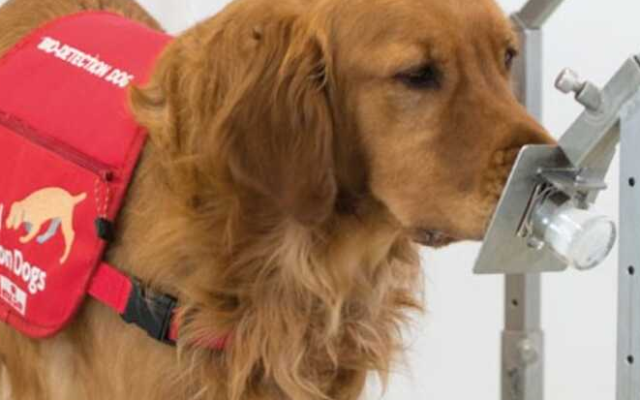Dogs Have Nose for Cancer and COVID
Medical research is finding that dogs can sniff out disease and more recently, changes in body odor from such respiratory diseases as the current global coronavirus.

For years Dr. Claire Guest, a British expert in animal behavior, studied the ability of certain breeds of dogs to sniff out disease. As she was working with her own dog, Daisy, a Labrador retriever, she noticed the dog poking her nose into the scientist’s chest, as if to call her attention to something that was going on in her own body.
Guest was surprised to find a small, barely detectible lump in her breast, and after a mammogram and a core biopsy, she was diagnosed with early stage breast cancer.
Because of the early diagnosis and prompt treatment, today, 11 years later, she is still cancer free. Guest started her British firm Medical Detection Dogs as a way to advance research. The firm’s website describes the nose of a dog as “the best biosensor we know of.”
The site goes on to state that dogs can detect “tiny traces (around one part per trillion – the equivalent of one teaspoon of sugar in two Olympic size swimming pools) of the odor created by different diseases.”
Scientists working in both the United States and in Britain point to promising new research that shows that dogs may also be able to easily and inexpensively sniff out the coronavirus. They point to the fact that respiratory diseases such as COVID-19 can produce subtle changes in personal body odor.
Arlene Weintraub, an author and former science writer for Business Week, wrote about the developments in her 2015 book “Heal: The Vital Role of Dogs in the Search for Cancer Cures.”
“Dogs can be trained to recognize certain scents,” she told the AJT. “Tumors are thought to give off scents that are not necessarily unique to them, but in concentrations that are unique. And so dogs can be trained to recognize that and then to alert when they find it.”
Researchers at Penn Vet Working Dog Center of the University of Pennsylvania School of Veterinary Medicine and at the London School of Hygiene & Tropical Medicine are trying to catch the odor of the virus from patients as they have for disorders such as Parkinson’s disease, which has no single reliable test for its presence in the body.
Research with dogs, according to Weintraub, could ultimately lead to the development of an electronic system that could detect viruses and disease by recognizing the volatile substances that have caused the dogs to react.
“What is so exciting is the effort to translate that sensory ability into a diagnostic tool. In other words, to invent an electronic nose, which several researchers have been trying to do, including a team at the Technion [Israel Institute of Technology] in Israel.”
Weintraub points to the work of professor Hossam Haick at Technion, who developed a prototype of an electronic nose that uses sub-microscopic gold metal sensors. Using the device, he has been able to flawlessly detect cancer in a group of 62 volunteers with head, neck and lung cancers. But, Weintraub warns, there are a number of regulatory hurdles to overcome before the device can be commercially marketed.
“It’s the type of thing that will take many years because in order to get it through regulatory approval like the FDA, it has to be near perfect.”
Much more promising is the role that dogs have played in developing drugs in a clinical setting. Unlike laboratory rats and mice, dogs naturally develop cancers.
Because of that, drug companies have been eager to test their new drugs in a setting that approximates real world conditions. According to Weintraub, because dogs process drugs in ways that are similar to humans, medical researchers have been particularly successful in creating drugs that act on the immune system.
“One big area is immunotherapy. These are drugs that help the immune system to recognize cancer as a foreign invader and to eliminate it like it would eliminate a virus or some other type of pathogen. Because cancer is very deceitful in the body, it can trick the immune system into not recognizing it as foreign. And that’s why cancer is so hard to treat. And so the same principle can be applied to treating dogs with cancer as well.”
Weintraub believes there is a new appreciation of dogs and the role they play in our lives, from the research being carried on to detect COVID-19 rapidly and effectively to the developing of what is described as the comparative oncology of drug therapy, using dogs to test drugs that might work in humans as well.
“I see a lot more listings of clinical trials for pets, meaning that if your dog develops cancer, you can enroll in a clinical trial and have a lot of your medical expenses paid for. And you have access to all this great cutting-edge research which may end up benefiting people.”




comments